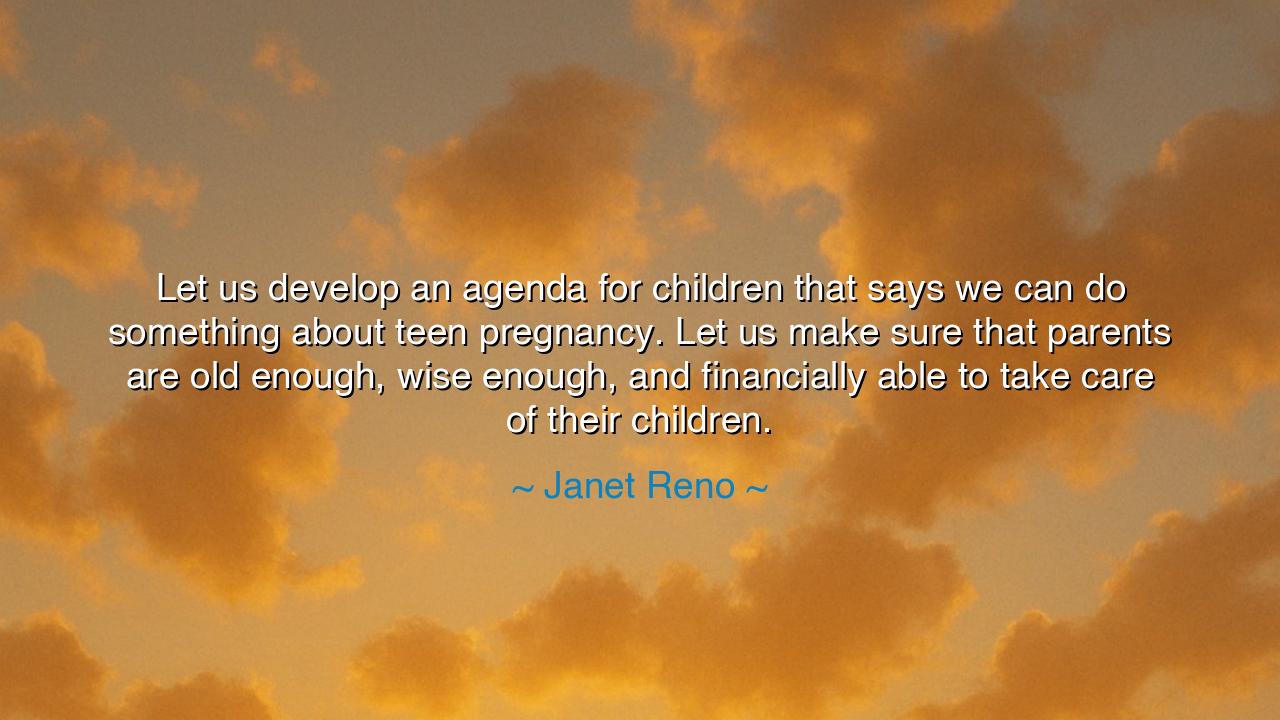
Let us develop an agenda for children that says we can do
Let us develop an agenda for children that says we can do something about teen pregnancy. Let us make sure that parents are old enough, wise enough, and financially able to take care of their children.






Hear the words of Janet Reno, who declared with vision and resolve: “Let us develop an agenda for children that says we can do something about teen pregnancy. Let us make sure that parents are old enough, wise enough, and financially able to take care of their children.” Though these words are framed as a call to policy, they carry within them a deeper truth about responsibility, foresight, and the sacred duty of raising the next generation.
When Reno speaks of an agenda for children, she is not merely speaking of programs and laws, but of a collective moral commitment. She reminds us that societies rise or fall based on how they care for their youngest, for in the laughter, health, and hope of children lies the destiny of nations. To protect them requires not only compassion but also wisdom, foresight, and the courage to address difficult truths.
The matter of teen pregnancy, in her words, is not framed as judgment but as concern—for both the child born and the parent who must bear responsibilities before they are ready. To be a parent requires maturity of spirit, stability of mind, and strength of means. Without these, the burden can break both generations, creating cycles of hardship that ripple outward into communities. Reno calls not for shame, but for preparation, for ensuring that parents are old enough to stand steady, wise enough to guide, and secure enough to provide.
History teaches us how critical this wisdom is. In ancient Sparta, children were seen as the lifeblood of the state, and the community worked collectively to ensure their training and well-being. In contrast, societies that neglected the preparation of their youth or left children vulnerable often slid into decline. Rome, in its later years, was marked by disintegration of family structures and the weakening of discipline and care, signs of a world that had forgotten its duty to nurture the young. Reno’s call echoes these lessons: if we fail to prepare parents, we fail the children; and if we fail the children, we fail the future.
Her words also remind us that raising children is not solely the work of individuals but the responsibility of society. Families need support—through education, access to healthcare, and community resources. To demand that every parent be wise and capable without providing the means for them to grow into such wisdom is to build a house on sand. Thus, Reno’s agenda calls for collective action: schools that teach responsibility, communities that provide resources, and governments that create conditions in which families can thrive.
The lesson for us is clear: do not treat the raising of children as a private matter alone, but as a sacred trust shared by all. On a personal level, this means preparing oneself before stepping into the role of parenthood—gaining wisdom, stability, and strength before carrying the responsibility of another life. On a societal level, it means building systems of education and support that ensure no child is born into preventable suffering.
So let Reno’s words be carried forward: the future belongs to those who prepare their children well. Let us not turn away from difficult issues, but face them with compassion and courage. Let us honor parenthood by ensuring that those who step into it are ready in body, mind, and spirit. For when we raise strong children, we raise a strong world, and when we build a foundation of care, wisdom, and preparation, we lay the stones of a future that will endure.






AAdministratorAdministrator
Welcome, honored guests. Please leave a comment, we will respond soon